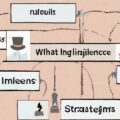What is Emotional Intelligence?
Emotional intelligence, often referred to as EQ, is the ability to recognize, understand, and manage our own emotions, as well as the emotions of others. It’s a powerful skill that can profoundly impact our relationships, decision-making, and overall well-being. Developing your emotional intelligence is not just about being “nice” or “empathetic” – it’s about cultivating a deeper understanding of yourself and those around you, leading to more meaningful connections and a more fulfilling life.
The Core Components of Emotional Intelligence
Emotional intelligence comprises several key components:
- Self-awareness: The ability to recognize and understand your own emotions, strengths, weaknesses, values, and motivations.
- Self-regulation: Managing your emotions and impulses effectively, adapting to changing circumstances.
- Motivation: Having a drive to achieve goals for reasons beyond external rewards.
- Empathy: The capacity to understand and share the feelings of others.
- Social skills: The ability to build and maintain relationships, communicate effectively, and influence others positively.
The Benefits of Developing Your Emotional Intelligence
Cultivating emotional intelligence can lead to numerous benefits in both personal and professional spheres:
- Improved relationships and communication
- Enhanced leadership skills
- Better stress management and mental health
- Increased empathy and compassion
- Greater self-awareness and personal growth
- More effective conflict resolution
By focusing on developing your EQ, you’re investing in your overall well-being and the quality of your interactions with others.
Practical Tips for Developing Your Emotional Intelligence
Enhancing your emotional intelligence is a journey of self-discovery and growth. Here are some practical tips to help you along the way:
- Practice mindfulness: Engage in regular mindfulness meditation to increase your self-awareness and ability to manage emotions.
- Keep an emotion journal: Write down your feelings and the situations that trigger them to identify patterns in your emotional responses.
- Seek feedback: Ask trusted friends, family, or colleagues for honest feedback about your emotional strengths and areas for improvement.
- Active listening: Focus on truly hearing and understanding others without immediately formulating your response.
- Empathy exercises: Practice putting yourself in others’ shoes and imagining their perspectives and feelings.
- Emotional vocabulary: Expand your emotional vocabulary to better articulate and understand nuanced feelings.
- Pause before reacting: When faced with emotionally charged situations, take a moment to breathe and consider your response.
Remember, developing emotional intelligence is a gradual process. Be patient and compassionate with yourself as you work on these skills.
Overcoming Challenges in Developing Emotional Intelligence
While the journey to higher emotional intelligence is rewarding, it’s not without its challenges. Here are some common obstacles and how to overcome them:
- Resistance to change: Acknowledge that change can be uncomfortable, but it’s necessary for growth. Start with small, manageable steps.
- Difficulty in self-reflection: If you find it hard to look inward, try guided self-reflection exercises or work with a therapist or coach.
- Fear of vulnerability: Remember that showing vulnerability is a sign of strength, not weakness. Start by opening up to trusted individuals.
- Ingrained habits: Be patient with yourself as you work to change long-standing emotional patterns. Celebrate small victories along the way.
The Role of Emotional Intelligence in Compassion and Well-being
Emotional intelligence plays a crucial role in fostering compassion and enhancing overall well-being. As you develop your EQ, you’ll likely find yourself more attuned to the needs and feelings of others, leading to more compassionate interactions. This increased empathy can create a positive ripple effect, improving not only your relationships but also contributing to a more understanding and kind society.
Moreover, a higher EQ can significantly boost your personal well-being. By better understanding and managing your emotions, you’re better equipped to handle life’s challenges, reduce stress, and maintain a more positive outlook. This emotional resilience can lead to improved mental health, greater life satisfaction, and a deeper sense of fulfillment.
Frequently Asked Questions
1. Can emotional intelligence be learned?
Yes, emotional intelligence can absolutely be learned and improved upon. While some people may naturally have higher EQ, it’s a skill that can be developed through practice, self-reflection, and conscious effort.
2. How long does it take to improve emotional intelligence?
The time it takes to improve emotional intelligence varies for each individual. Consistent effort can lead to noticeable improvements in a few months, but it’s an ongoing process of growth and development throughout life.
3. Is emotional intelligence more important than IQ?
Both emotional intelligence and IQ are important in different ways. While IQ is crucial for cognitive tasks, EQ is often considered more important for success in relationships, leadership, and overall life satisfaction.
4. How can I assess my current level of emotional intelligence?
There are various EQ assessments available online. However, self-reflection, seeking feedback from others, and observing your reactions in different situations can also give you valuable insights into your emotional intelligence.
5. Can too much emotional intelligence be a bad thing?
While it’s rare, being overly attuned to emotions can sometimes lead to emotional exhaustion or difficulty in making decisions. The key is to balance emotional awareness with practical reasoning and self-care.
Developing your emotional intelligence is a lifelong journey that can lead to profound personal growth and improved relationships. By focusing on self-awareness, empathy, and emotional management, you’re not just enhancing your own life – you’re contributing to a more compassionate and understanding world. Remember, every step you take towards higher EQ is a step towards a more fulfilling and connected life.









